Unit 4 Drawing in the park Story time 课件(共68张PPT)
文档属性
| 名称 | Unit 4 Drawing in the park Story time 课件(共68张PPT) |
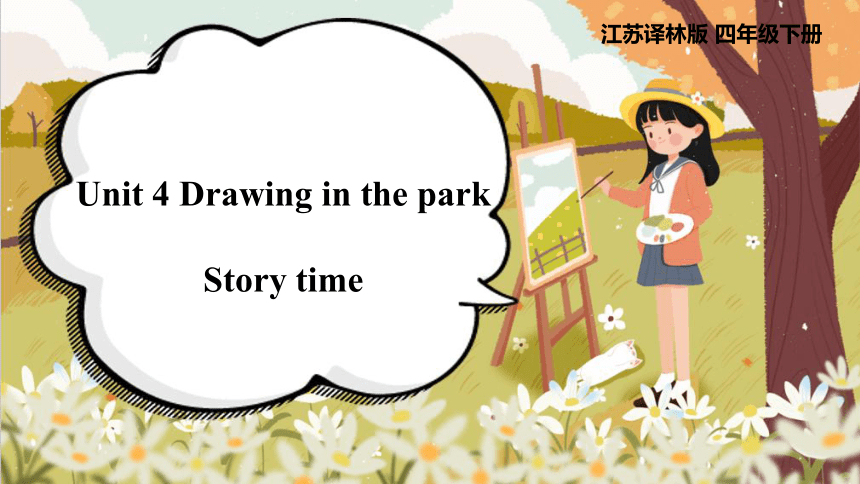
|
|
| 格式 | pptx | ||
| 文件大小 | 19.4MB | ||
| 资源类型 | 试卷 | ||
| 版本资源 | 牛津译林版 | ||
| 科目 | 英语 | ||
| 更新时间 | 2024-03-06 00:00:00 | ||
图片预览

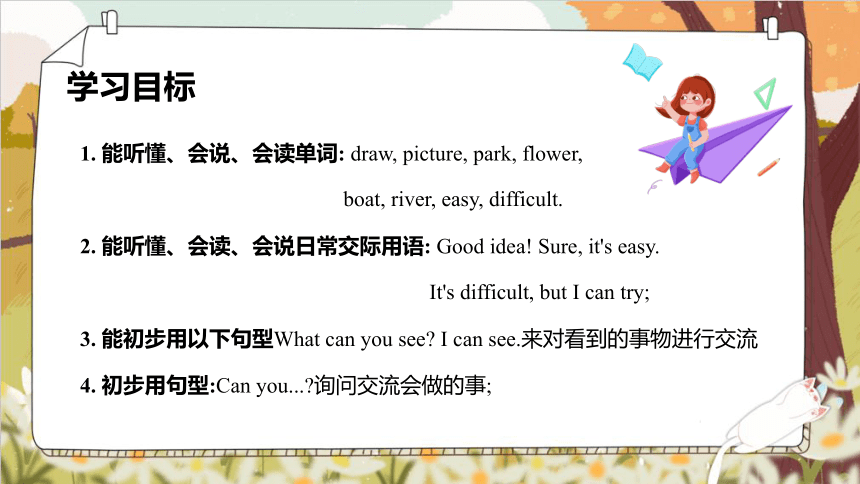
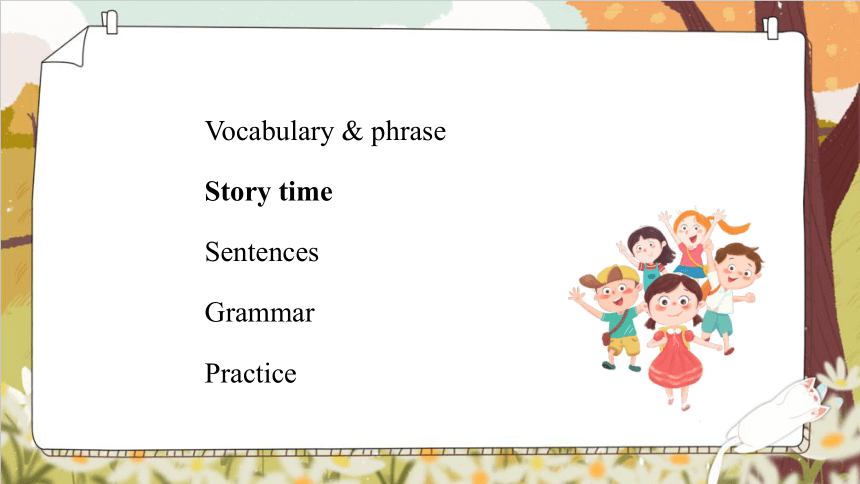
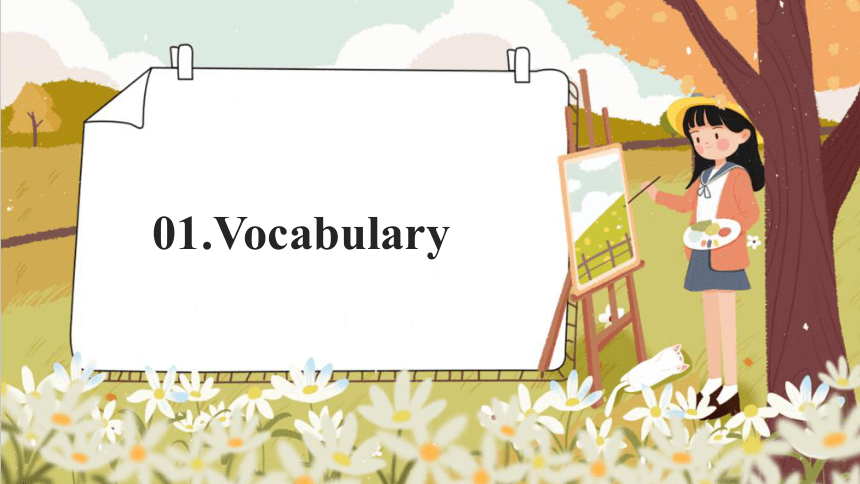
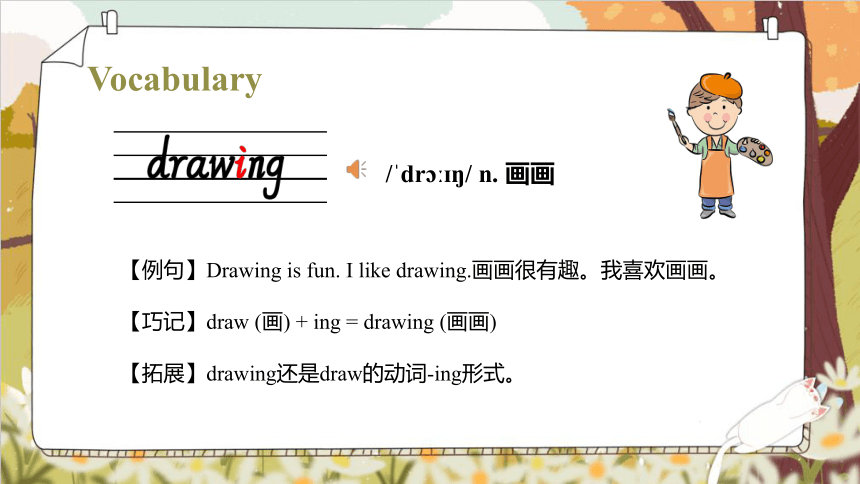
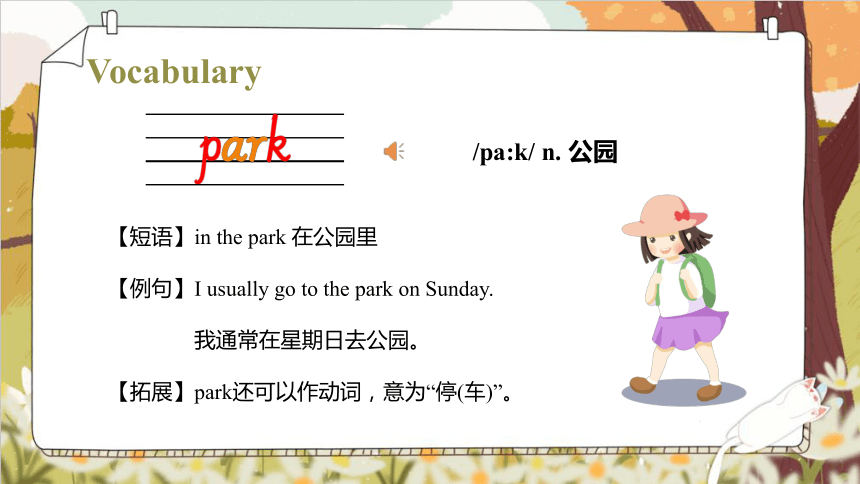
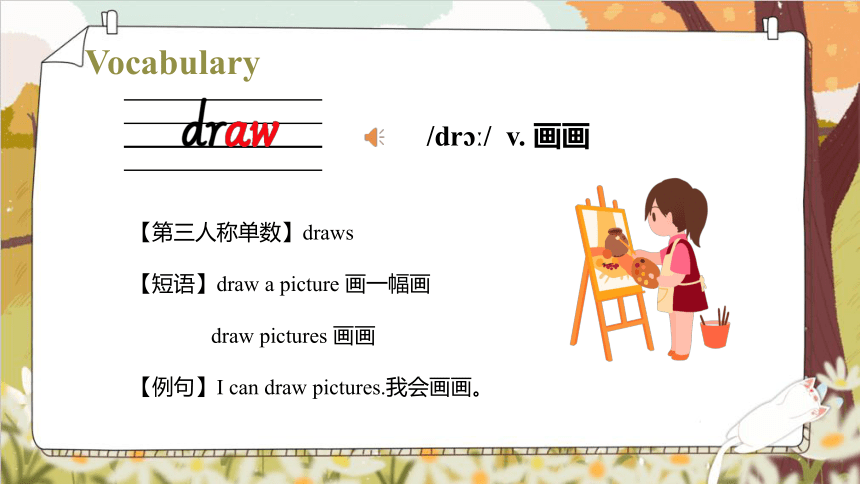


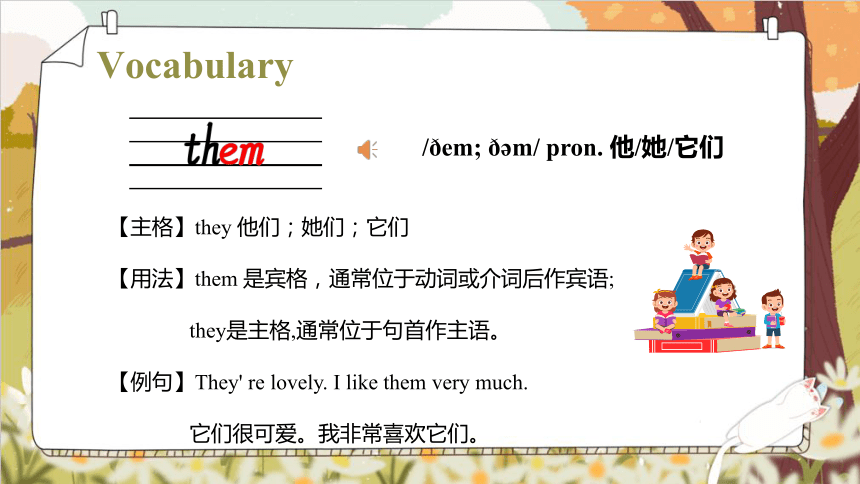
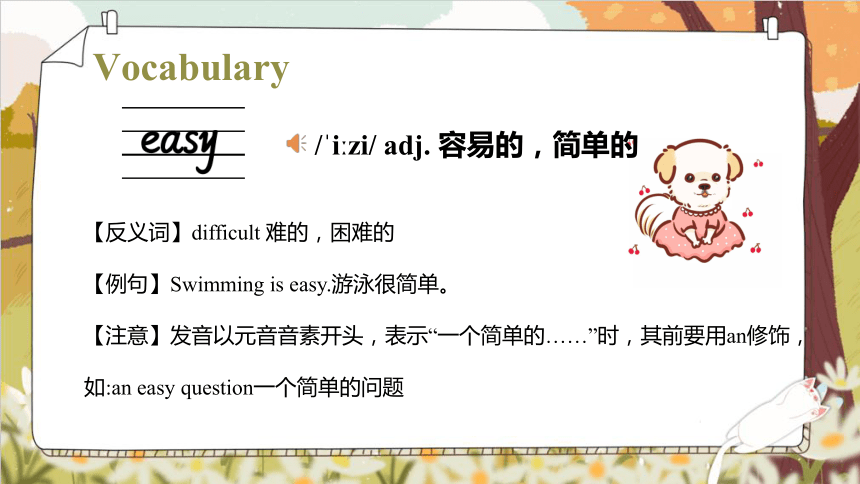
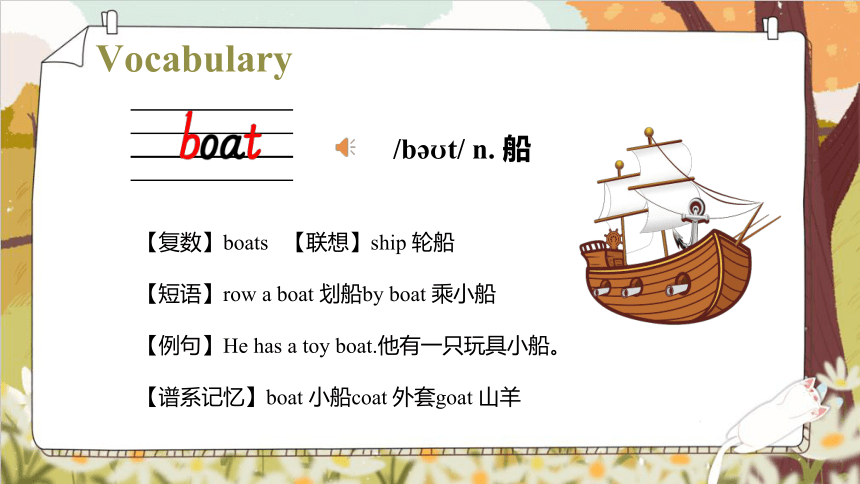
文档简介
(共68张PPT)
Unit 4 Drawing in the park
Story time
江苏译林版 四年级下册
1. 能听懂、会说、会读单词: draw, picture, park, flower,
boat, river, easy, difficult.
2. 能听懂、会读、会说日常交际用语: Good idea! Sure, it's easy.
It's difficult, but I can try;
3. 能初步用以下句型What can you see I can see.来对看到的事物进行交流
4. 初步用句型:Can you... 询问交流会做的事;
学习目标
Vocabulary & phrase
Story time
Sentences
Grammar
Practice
01.Vocabulary
【例句】Drawing is fun. I like drawing.画画很有趣。我喜欢画画。
【巧记】draw (画) + ing = drawing (画画)
【拓展】drawing还是draw的动词-ing形式。
Vocabulary
/ dr / n. 画画
Vocabulary
【短语】in the park 在公园里
【例句】I usually go to the park on Sunday.
我通常在星期日去公园。
【拓展】park还可以作动词,意为“停(车)”。
/pa:k/ n. 公园
Vocabulary
【第三人称单数】draws
【短语】draw a picture 画一幅画
draw pictures 画画
【例句】I can draw pictures.我会画画。
/dr / v. 画画
Vocabulary
【短语】讲解用于赞成或认可对方的提议或想法,常用于回答祈使句"Let's ...”
【例句】—Let's play football.让我们踢足球吧。
—Good idea!好主意!
好主意
Vocabulary
/ fla (r)/n. 花朵
【复数】flowers
【短语】lovely flowers 美丽的花朵
a red flower 一朵红花
【例句】There are many flowers in the park.公园里有许多花。
【主格】they 他们;她们;它们
【用法】them 是宾格,通常位于动词或介词后作宾语;
they是主格,通常位于句首作主语。
【例句】They' re lovely. I like them very much.
它们很可爱。我非常喜欢它们。
Vocabulary
/ em; m/ pron. 他/她/它们
【反义词】difficult 难的,困难的
【例句】Swimming is easy.游泳很简单。
【注意】发音以元音音素开头,表示“一个简单的……”时,其前要用an修饰,如:an easy question一个简单的问题
Vocabulary
/ i zi/ adj. 容易的,简单的
Vocabulary
/b t/ n. 船
【复数】boats 【联想】ship 轮船
【短语】row a boat 划船by boat 乘小船
【例句】He has a toy boat.他有一只玩具小船。
【谱系记忆】boat 小船coat 外套goat 山羊
【短语】on the river 在河面上
in the river 在河里
the Changjiang River 长江
【例句】You can't swim in the river.你们不能在河里游泳。
Vocabulary
/ r v (r)/ n. 河流
Vocabulary
【近义词】hard 困苦的;艰难的
【反义词】easy 容易的,简单的
【例句】Drawing is difficult for me.画画对我来说很难。
/ d f k lt/ adj. 难的,困难的
Vocabulary
【第三人称单数】tries
【形近词】cry 哭
【例句】Who can try 谁能试一试?
【拓展】try (名词)尝试如: have a try试一试
/tra / v.(动词)试
Vocabulary
【复数】hills
【短语】on the hill 在小山上
【例句】I can see a hill in the park.我能在公园里看到一座小山。
【联想】mountain 山,山脉
/h l/ n. 小山,山丘
Vocabulary
【复数】lakes
【形近词】cake 蛋糕 make 制作
【短语】on the lake 在湖面上 in the lake 在湖里
【例句】This is a big lake.这是一个大湖。
/le k/ n. 湖
Vocabulary
1.drawing 画画 8.boat 小船
2.park 公园 9.river 河/江
3.draw 画 10.difficult 难得/困难的
4.Good idea! 好主意! 11.try 试
5.flower 花/花朵 12.hill 小山/山丘
6.them 他们/她们/它们 13.lake 湖/湖泊
7.easy 容易的/简单的 14.again 再一次/又一次
Vocabulary
02.Story time
Story time
让我们在这里画一些图。
好主意!
⑴Let’s draw some pictures here. 让我们这儿画一些画吧。
①Let+人称代词宾格+动词原形.
→[记忆公式:let sb do sth让某人做某事]
选词填空:Let’s __________(draw/drawing) in the park.
用所给词的适当形式填空:Let’s __________(go) to the park on Sunday.
Story time
⑴Let’s draw some pictures here. 让我们这儿画一些画吧。
②picture 图画→draw pictures画画
照片→take pictures拍照=take photos
③句型“Let’s...”常用答语:Good idea!/ OK!/ All right.
Story time
⑵Good idea! 好主意!→用于表示赞同或认可某事
①an idea一个主意
②a good/great idea一个好主意
Story time
Story time
踢足球
你在那边能看到什么
你能画出来吗
我能看到一棵树和一些花。
确定。很容易。
What can you see... 你能看到......有什么?
→用来询问别人能看到某地有什么
答语为:I can see...
[例题]<根据中文提示完成句子>
你能看到门后有什么?______ ______ ______ ______ ______ ______ ______
我能看到一只鸟。______ ______ ______ ______ ______.
注:can是情态动词,后接动词原形
用所给词的适当形式填空
Mike can __________(play) football very well.
⑵Can+主语+动词原形... →用来询问某人会不会做某事
答语为:Yes, 主语+can./ No, 主语+can’t.
<选择题>( ) —Can your grandma make cakes —Yes, ______.
A. she can B. he can C. she do
⑶人称代词宾格
第一人称 第二人称 第三人称
单数 复数 单数 复数 单数 复数
me us you you him/her/it them
Story time
用法: 位于动词后,作动词的宾语,即“动宾” 位于介词后,作介词的宾语,即“介宾”
<用所给词的适当形式填空>
These apples are for __________(he).
My brother likes __________(you) very much.
Let’s help __________(they).
I want to eat __________(it).
I sit behind __________(she).
Story time
这是树,这些是花。
做得好。
⑴this(指示代词)这/这个 →指近处的人或物,复数形式为:these这些
<按要求完成句子>Is this a boat (改为复数句)
__________ __________ __________
⑵that(指示代词)那/那个 →指远处的人或物,复数形式为:those这些
<用所给词的适当形式填空>
—What are __________(that) over there —They’re __________(box).
Story time
你能看见河上的船吗
你会画它吗
是的。
这很难,但我可以试试。
这是一条船吗
⑴on the river在河面上/在河上 →表示船等在河面上 in the river在河里 →表示鱼等在河里 [例题]<选择题>( ) I can see some ducks ______. A. on the river B. in the river C. on river <改错>( ) I can see some fish on the river. _______________ A B C
Story time
⑵difficult(形容词)难的/困难的 →反义词:easy简单的/同义词:hard <选词填空> —Can you draw a tiger
—It’s __________(easy/difficult), but I can try.⑶but(转折连词)但是 →用来连接意思相反或相对的两个分句<选择题>( ) Tim can draw, ______ he can’t play table tennis. A. but B. and C. or
⑷try(动词)试 →(三单)tries
①try on试穿
→try on the coat试穿这件外套/ try it on试穿它
②(名词)have a try试一试
Story time
03.Sentences
Let's draw some pictures here.
让我们在这里画一些画吧。
Good idea!
好主意!
Sentences
Sentences
What can you see over there 你在那边能看到什么?
I can see a tree and some flowers. 我能看到一棵树和一些花。
Can you draw them 你能画它们吗?
Sure. It's easy. 当然。这很容易。
Sentences
This is the tree and these are the flowers.
这是树,这些是花。
Well done.
干得好。
Sentences
Can you see the boat on the river 你能看到河上的小船吗?
Yes. 是的。
Can you draw it 你能画它吗?
It's difficult, but I can try. 这很难,但是我可以试一试。
Sentences
Is this a boat
这是一只小船吗?
Sentences
a boat 一只小船 a flower 一朵花
a tree 一棵树 a hill 一座山
a lake 一个湖 a river 一条河
Grammar
see, look, watch, read的区别
1)see,看见,看到,强调看的结果。
如:Can you see a cake over there
你能看见那里的蛋糕吗?
Grammar
see, look, watch, read的区别
2)look, 通常用来引起对方的注意,强调看的动作。
如:Look! That’s my father!看!那是我父亲。
如果表示看人或物时,则用look at
如: Look at the boy.瞧那男孩。 Look at the blackboard, please.请看黑板。
Grammar
see, look, watch, read的区别
3)watch,强调专注地看,意思是观看、注视,通常用来指看电视球赛或戏剧等移动着的画面或物体。
如: I usually watch TV at seven.我通常七点看电视。
Let’s go and watch the football match after school. 放学后我们去看足球赛吧。
Grammar
see, look, watch, read的区别
4)read,阅读,通常指看书刊报纸杂志等。
如: I can read books .
Grammar
情态动词can
(1)情态动词,表示“能够、可能”,后面必须加动词原型
eg:I can swim very well.
Grammar
(2)I/ You/ He/ She/ It / We/ You/ They 所有人称都用can,不分单复数
陈述句:以句号结尾,句中没有not。
例如:I can see a tree.
否定句:以句号结尾,句中有not或no。
例如:I can not see a tree. I cannot see a tree.
Grammar
(2)I/ You/ He/ She/ It / We/ You/ They 所有人称都用can,不分单复数
一般疑问句:以问号结尾,can在句首。
例如:Can you see a tree...
肯定回答:Yes, I can. 否定回答:No, I can’t.
特殊疑问句:以问号结尾,句首为疑问词。
例如:What can you see 回答:I can see a tree.
Grammar
询问对方能做什么的句型及答语
What can you+动词原形+其他...
I/we can+动词原形+其他.......
What can you see over there 在那边你能看到什么?
I can see a tree and some flowers.我能看到一棵树和一些花。
Grammar
Can 能,会 是情态动词,后面接动词原形,没有人称和数的变化
I can do housework.我能做家务了。
She can do homework.她能做作业。
We can go to the zoo.我们能去动物园。
Grammar
询问对方是否看都某物的句型
Can you see.... can you see+名词/人称代词宾格
Can you see the boat on the river 你能看到河上的船吗?
Can you see him 你看到他了吗?
应答: Yes, I can No, I can’t.
04.Practice
( )1.______can you see over there I can see some flowers.
A.What B. When C. Where
( )2. Can you draw the boat?___________.
A. Sure. B. It’s a boat. C. Look at the boat.
( )3.This _______the tree. These_______ the flowers.
A. is, are B. are, are C. are, is
用所给词的适当形式填空。
1.Look at________(that)birds in the tree. They’re________(love).
2.I can see__________(any)swans on the lake.
3.I can’t skate.It’s__________(no)easy for me.
4.Sandy likes__________(play)basketball on the playground.
选词填空。1.Let (we/us) draw a picture.2.What can you see over (here/there) 3.I can see many (flowers/flower).4.I have (a/an) orange boat.
选词填空。5.Can you draw (they/them) 6.Look! (These/This) is the tree.7.The boat is (at/on) the river.8.It's difficult, but I (can’t/can) try.
单项选择。( )1.—Where is the bird —It’s the tree.A.on B.for C.in( )2.—Where is the boat —It's the riverA.on B.behind C.under( )3.—What colour is it — .A.It's an orange B.It's orange C.It's a red apple
( )4.—What do you have —I some flowers.A.see B.am C.have( )5.Can you football A.like B.play the C.play( )6.—How many do you have —one.A.apple B.mango C.grapes
( )7.—What's over there —It’s a lion.A.this B.that C.those( )8.What colour the pictures A.am B.are C.is( )9.—Can you draw a horse — .A.Yes, I do B.No, I can C. Sure
( )10.I can see a bird and elephants.A.a B.an C.some( )11. a nice little book! I like it very much.A.How B.What C.What’s( )12.—Let’s meet four Sunday afternoon.—OKA.at;in B.at;on C.in;on
按要求改写句子。1.I can see twenty-four books on the desk(对画线部分提问) books can you see on the desk?2.I can see some flowers in the garden.(对画线部分提问) you see in the garden 3.He can play football.(对画线部分提问) Can he
3. This is a boat.(改为复数句) These .5.I can make a salad.(改为一般疑问句) make a salad 6.I can see an orange in the bag.(改为否定句)I an orange in the bag.
根据中文提示完成句子。1.—你能在河上看到什么?—我能看到一些小船。— you see the river —I can see some .2.—你会画一些鸭子吗? —有点难,但我可以试一试。—Can you any —It’s a little ,but I can .
3.—我会游泳,你会什么 —我会溜冰。—I can . can you ? —I can .4.—你在那儿能看到什么 —我能看到一棵梨树。— you see over there —I can see a .
5.—你会画它们吗 —当然,它很容易。
—Can you them
—Sure.It's very .
阅读对话,根据短文内容,判断正(T)误(F)。
It’s Sunday morning. Bill and Mike are drawing in the park. They are talking about how to draw.
Bill:Mike,what can you see over there?
Mike:I can see a hill and a lake.
Bill:Can you draw them?
Mike:Sure,It’s easy. Look,this is the lake and that is the hill.
Bill:Well done.
Mike:What can you see on the lake?
Bill: I can see two boats.
Mike:Can you draw them?
Bill:Sure. It’s not difficult.
( )1.It’s Sunday afternoon.( )2.Mike can draw a hill and a lake.( )3.They can see some flowers in the hill.( )4.There are three boats on the lake.( )5.Bill can draw a boat.
Thank you!
江苏译林版 四年级下册
Unit 4 Drawing in the park
Story time
江苏译林版 四年级下册
1. 能听懂、会说、会读单词: draw, picture, park, flower,
boat, river, easy, difficult.
2. 能听懂、会读、会说日常交际用语: Good idea! Sure, it's easy.
It's difficult, but I can try;
3. 能初步用以下句型What can you see I can see.来对看到的事物进行交流
4. 初步用句型:Can you... 询问交流会做的事;
学习目标
Vocabulary & phrase
Story time
Sentences
Grammar
Practice
01.Vocabulary
【例句】Drawing is fun. I like drawing.画画很有趣。我喜欢画画。
【巧记】draw (画) + ing = drawing (画画)
【拓展】drawing还是draw的动词-ing形式。
Vocabulary
/ dr / n. 画画
Vocabulary
【短语】in the park 在公园里
【例句】I usually go to the park on Sunday.
我通常在星期日去公园。
【拓展】park还可以作动词,意为“停(车)”。
/pa:k/ n. 公园
Vocabulary
【第三人称单数】draws
【短语】draw a picture 画一幅画
draw pictures 画画
【例句】I can draw pictures.我会画画。
/dr / v. 画画
Vocabulary
【短语】讲解用于赞成或认可对方的提议或想法,常用于回答祈使句"Let's ...”
【例句】—Let's play football.让我们踢足球吧。
—Good idea!好主意!
好主意
Vocabulary
/ fla (r)/n. 花朵
【复数】flowers
【短语】lovely flowers 美丽的花朵
a red flower 一朵红花
【例句】There are many flowers in the park.公园里有许多花。
【主格】they 他们;她们;它们
【用法】them 是宾格,通常位于动词或介词后作宾语;
they是主格,通常位于句首作主语。
【例句】They' re lovely. I like them very much.
它们很可爱。我非常喜欢它们。
Vocabulary
/ em; m/ pron. 他/她/它们
【反义词】difficult 难的,困难的
【例句】Swimming is easy.游泳很简单。
【注意】发音以元音音素开头,表示“一个简单的……”时,其前要用an修饰,如:an easy question一个简单的问题
Vocabulary
/ i zi/ adj. 容易的,简单的
Vocabulary
/b t/ n. 船
【复数】boats 【联想】ship 轮船
【短语】row a boat 划船by boat 乘小船
【例句】He has a toy boat.他有一只玩具小船。
【谱系记忆】boat 小船coat 外套goat 山羊
【短语】on the river 在河面上
in the river 在河里
the Changjiang River 长江
【例句】You can't swim in the river.你们不能在河里游泳。
Vocabulary
/ r v (r)/ n. 河流
Vocabulary
【近义词】hard 困苦的;艰难的
【反义词】easy 容易的,简单的
【例句】Drawing is difficult for me.画画对我来说很难。
/ d f k lt/ adj. 难的,困难的
Vocabulary
【第三人称单数】tries
【形近词】cry 哭
【例句】Who can try 谁能试一试?
【拓展】try (名词)尝试如: have a try试一试
/tra / v.(动词)试
Vocabulary
【复数】hills
【短语】on the hill 在小山上
【例句】I can see a hill in the park.我能在公园里看到一座小山。
【联想】mountain 山,山脉
/h l/ n. 小山,山丘
Vocabulary
【复数】lakes
【形近词】cake 蛋糕 make 制作
【短语】on the lake 在湖面上 in the lake 在湖里
【例句】This is a big lake.这是一个大湖。
/le k/ n. 湖
Vocabulary
1.drawing 画画 8.boat 小船
2.park 公园 9.river 河/江
3.draw 画 10.difficult 难得/困难的
4.Good idea! 好主意! 11.try 试
5.flower 花/花朵 12.hill 小山/山丘
6.them 他们/她们/它们 13.lake 湖/湖泊
7.easy 容易的/简单的 14.again 再一次/又一次
Vocabulary
02.Story time
Story time
让我们在这里画一些图。
好主意!
⑴Let’s draw some pictures here. 让我们这儿画一些画吧。
①Let+人称代词宾格+动词原形.
→[记忆公式:let sb do sth让某人做某事]
选词填空:Let’s __________(draw/drawing) in the park.
用所给词的适当形式填空:Let’s __________(go) to the park on Sunday.
Story time
⑴Let’s draw some pictures here. 让我们这儿画一些画吧。
②picture 图画→draw pictures画画
照片→take pictures拍照=take photos
③句型“Let’s...”常用答语:Good idea!/ OK!/ All right.
Story time
⑵Good idea! 好主意!→用于表示赞同或认可某事
①an idea一个主意
②a good/great idea一个好主意
Story time
Story time
踢足球
你在那边能看到什么
你能画出来吗
我能看到一棵树和一些花。
确定。很容易。
What can you see... 你能看到......有什么?
→用来询问别人能看到某地有什么
答语为:I can see...
[例题]<根据中文提示完成句子>
你能看到门后有什么?______ ______ ______ ______ ______ ______ ______
我能看到一只鸟。______ ______ ______ ______ ______.
注:can是情态动词,后接动词原形
用所给词的适当形式填空
Mike can __________(play) football very well.
⑵Can+主语+动词原形... →用来询问某人会不会做某事
答语为:Yes, 主语+can./ No, 主语+can’t.
<选择题>( ) —Can your grandma make cakes —Yes, ______.
A. she can B. he can C. she do
⑶人称代词宾格
第一人称 第二人称 第三人称
单数 复数 单数 复数 单数 复数
me us you you him/her/it them
Story time
用法: 位于动词后,作动词的宾语,即“动宾” 位于介词后,作介词的宾语,即“介宾”
<用所给词的适当形式填空>
These apples are for __________(he).
My brother likes __________(you) very much.
Let’s help __________(they).
I want to eat __________(it).
I sit behind __________(she).
Story time
这是树,这些是花。
做得好。
⑴this(指示代词)这/这个 →指近处的人或物,复数形式为:these这些
<按要求完成句子>Is this a boat (改为复数句)
__________ __________ __________
⑵that(指示代词)那/那个 →指远处的人或物,复数形式为:those这些
<用所给词的适当形式填空>
—What are __________(that) over there —They’re __________(box).
Story time
你能看见河上的船吗
你会画它吗
是的。
这很难,但我可以试试。
这是一条船吗
⑴on the river在河面上/在河上 →表示船等在河面上 in the river在河里 →表示鱼等在河里 [例题]<选择题>( ) I can see some ducks ______. A. on the river B. in the river C. on river <改错>( ) I can see some fish on the river. _______________ A B C
Story time
⑵difficult(形容词)难的/困难的 →反义词:easy简单的/同义词:hard <选词填空> —Can you draw a tiger
—It’s __________(easy/difficult), but I can try.⑶but(转折连词)但是 →用来连接意思相反或相对的两个分句<选择题>( ) Tim can draw, ______ he can’t play table tennis. A. but B. and C. or
⑷try(动词)试 →(三单)tries
①try on试穿
→try on the coat试穿这件外套/ try it on试穿它
②(名词)have a try试一试
Story time
03.Sentences
Let's draw some pictures here.
让我们在这里画一些画吧。
Good idea!
好主意!
Sentences
Sentences
What can you see over there 你在那边能看到什么?
I can see a tree and some flowers. 我能看到一棵树和一些花。
Can you draw them 你能画它们吗?
Sure. It's easy. 当然。这很容易。
Sentences
This is the tree and these are the flowers.
这是树,这些是花。
Well done.
干得好。
Sentences
Can you see the boat on the river 你能看到河上的小船吗?
Yes. 是的。
Can you draw it 你能画它吗?
It's difficult, but I can try. 这很难,但是我可以试一试。
Sentences
Is this a boat
这是一只小船吗?
Sentences
a boat 一只小船 a flower 一朵花
a tree 一棵树 a hill 一座山
a lake 一个湖 a river 一条河
Grammar
see, look, watch, read的区别
1)see,看见,看到,强调看的结果。
如:Can you see a cake over there
你能看见那里的蛋糕吗?
Grammar
see, look, watch, read的区别
2)look, 通常用来引起对方的注意,强调看的动作。
如:Look! That’s my father!看!那是我父亲。
如果表示看人或物时,则用look at
如: Look at the boy.瞧那男孩。 Look at the blackboard, please.请看黑板。
Grammar
see, look, watch, read的区别
3)watch,强调专注地看,意思是观看、注视,通常用来指看电视球赛或戏剧等移动着的画面或物体。
如: I usually watch TV at seven.我通常七点看电视。
Let’s go and watch the football match after school. 放学后我们去看足球赛吧。
Grammar
see, look, watch, read的区别
4)read,阅读,通常指看书刊报纸杂志等。
如: I can read books .
Grammar
情态动词can
(1)情态动词,表示“能够、可能”,后面必须加动词原型
eg:I can swim very well.
Grammar
(2)I/ You/ He/ She/ It / We/ You/ They 所有人称都用can,不分单复数
陈述句:以句号结尾,句中没有not。
例如:I can see a tree.
否定句:以句号结尾,句中有not或no。
例如:I can not see a tree. I cannot see a tree.
Grammar
(2)I/ You/ He/ She/ It / We/ You/ They 所有人称都用can,不分单复数
一般疑问句:以问号结尾,can在句首。
例如:Can you see a tree...
肯定回答:Yes, I can. 否定回答:No, I can’t.
特殊疑问句:以问号结尾,句首为疑问词。
例如:What can you see 回答:I can see a tree.
Grammar
询问对方能做什么的句型及答语
What can you+动词原形+其他...
I/we can+动词原形+其他.......
What can you see over there 在那边你能看到什么?
I can see a tree and some flowers.我能看到一棵树和一些花。
Grammar
Can 能,会 是情态动词,后面接动词原形,没有人称和数的变化
I can do housework.我能做家务了。
She can do homework.她能做作业。
We can go to the zoo.我们能去动物园。
Grammar
询问对方是否看都某物的句型
Can you see.... can you see+名词/人称代词宾格
Can you see the boat on the river 你能看到河上的船吗?
Can you see him 你看到他了吗?
应答: Yes, I can No, I can’t.
04.Practice
( )1.______can you see over there I can see some flowers.
A.What B. When C. Where
( )2. Can you draw the boat?___________.
A. Sure. B. It’s a boat. C. Look at the boat.
( )3.This _______the tree. These_______ the flowers.
A. is, are B. are, are C. are, is
用所给词的适当形式填空。
1.Look at________(that)birds in the tree. They’re________(love).
2.I can see__________(any)swans on the lake.
3.I can’t skate.It’s__________(no)easy for me.
4.Sandy likes__________(play)basketball on the playground.
选词填空。1.Let (we/us) draw a picture.2.What can you see over (here/there) 3.I can see many (flowers/flower).4.I have (a/an) orange boat.
选词填空。5.Can you draw (they/them) 6.Look! (These/This) is the tree.7.The boat is (at/on) the river.8.It's difficult, but I (can’t/can) try.
单项选择。( )1.—Where is the bird —It’s the tree.A.on B.for C.in( )2.—Where is the boat —It's the riverA.on B.behind C.under( )3.—What colour is it — .A.It's an orange B.It's orange C.It's a red apple
( )4.—What do you have —I some flowers.A.see B.am C.have( )5.Can you football A.like B.play the C.play( )6.—How many do you have —one.A.apple B.mango C.grapes
( )7.—What's over there —It’s a lion.A.this B.that C.those( )8.What colour the pictures A.am B.are C.is( )9.—Can you draw a horse — .A.Yes, I do B.No, I can C. Sure
( )10.I can see a bird and elephants.A.a B.an C.some( )11. a nice little book! I like it very much.A.How B.What C.What’s( )12.—Let’s meet four Sunday afternoon.—OKA.at;in B.at;on C.in;on
按要求改写句子。1.I can see twenty-four books on the desk(对画线部分提问) books can you see on the desk?2.I can see some flowers in the garden.(对画线部分提问) you see in the garden 3.He can play football.(对画线部分提问) Can he
3. This is a boat.(改为复数句) These .5.I can make a salad.(改为一般疑问句) make a salad 6.I can see an orange in the bag.(改为否定句)I an orange in the bag.
根据中文提示完成句子。1.—你能在河上看到什么?—我能看到一些小船。— you see the river —I can see some .2.—你会画一些鸭子吗? —有点难,但我可以试一试。—Can you any —It’s a little ,but I can .
3.—我会游泳,你会什么 —我会溜冰。—I can . can you ? —I can .4.—你在那儿能看到什么 —我能看到一棵梨树。— you see over there —I can see a .
5.—你会画它们吗 —当然,它很容易。
—Can you them
—Sure.It's very .
阅读对话,根据短文内容,判断正(T)误(F)。
It’s Sunday morning. Bill and Mike are drawing in the park. They are talking about how to draw.
Bill:Mike,what can you see over there?
Mike:I can see a hill and a lake.
Bill:Can you draw them?
Mike:Sure,It’s easy. Look,this is the lake and that is the hill.
Bill:Well done.
Mike:What can you see on the lake?
Bill: I can see two boats.
Mike:Can you draw them?
Bill:Sure. It’s not difficult.
( )1.It’s Sunday afternoon.( )2.Mike can draw a hill and a lake.( )3.They can see some flowers in the hill.( )4.There are three boats on the lake.( )5.Bill can draw a boat.
Thank you!
江苏译林版 四年级下册
